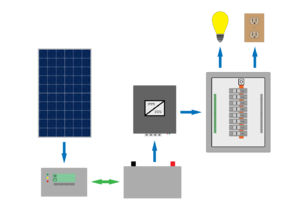Difference between revisions of "DC-DC converter"
Jump to navigation
Jump to search
| Line 1: | Line 1: | ||
[[Category:Loads]] | [[Category:Loads]] | ||
| + | <languages /> | ||
| + | <translate> | ||
[[File:DC-DCconnections.png|thumb|right|A DC-DC converter that is between the battery bank and DC loads.]] | [[File:DC-DCconnections.png|thumb|right|A DC-DC converter that is between the battery bank and DC loads.]] | ||
| − | DC-DC converters are used to power appliances that run on a different voltage than the [[Energy storage|energy storage system]] supplies. There are two types of DC converters: step-down DC converters (output a lower voltage) and step-up DC converters (output a higher voltage). The majority of [[: | + | |
| + | DC-DC converters are used to power appliances that run on a different voltage than the [[Special:MyLanguage/Energy storage|energy storage system]] supplies. There are two types of DC converters: step-down DC converters (output a lower voltage) and step-up DC converters (output a higher voltage). The majority of [[Special:MyLanguage/Energy efficient loads|appliances]] and [[Special:MyLanguage/Lighting|lighting]]are designed for use with 12 V systems, fewer for 24 V systems, and very limited options for use with 48 V systems. A step-down DC converter to 12 V from 24 V or 48 V is the most common application. | ||
A DC-DC converter is rated based upon the maximum current that it can pass through. They can be sized as follows: | A DC-DC converter is rated based upon the maximum current that it can pass through. They can be sized as follows: | ||
| Line 9: | Line 12: | ||
! style="text-align:left;"| = Sum of all the power rating of all loads/lights ÷ Output voltage | ! style="text-align:left;"| = Sum of all the power rating of all loads/lights ÷ Output voltage | ||
|} | |} | ||
| + | |||
| + | ==Notes/references== | ||
| + | </translate> | ||
Revision as of 12:05, 15 February 2021
DC-DC converters are used to power appliances that run on a different voltage than the energy storage system supplies. There are two types of DC converters: step-down DC converters (output a lower voltage) and step-up DC converters (output a higher voltage). The majority of appliances and lightingare designed for use with 12 V systems, fewer for 24 V systems, and very limited options for use with 48 V systems. A step-down DC converter to 12 V from 24 V or 48 V is the most common application.
A DC-DC converter is rated based upon the maximum current that it can pass through. They can be sized as follows:
| Minimum current rating of the DC-DC converter | = Sum of all the power rating of all loads/lights ÷ Output voltage |
|---|
